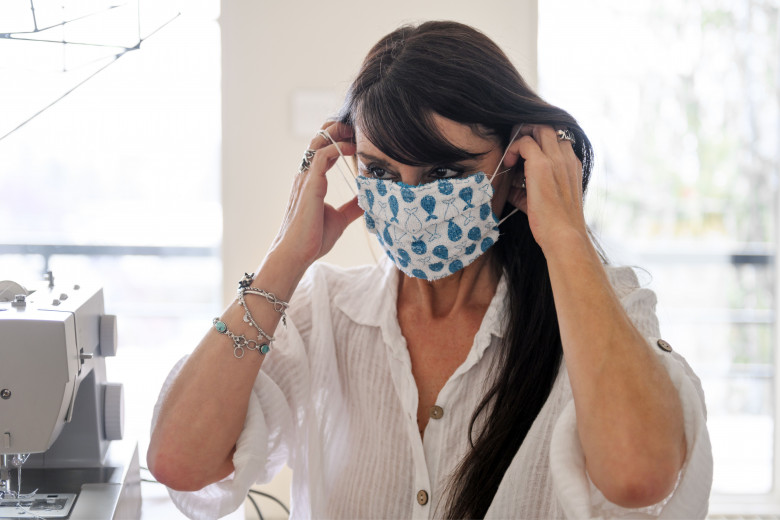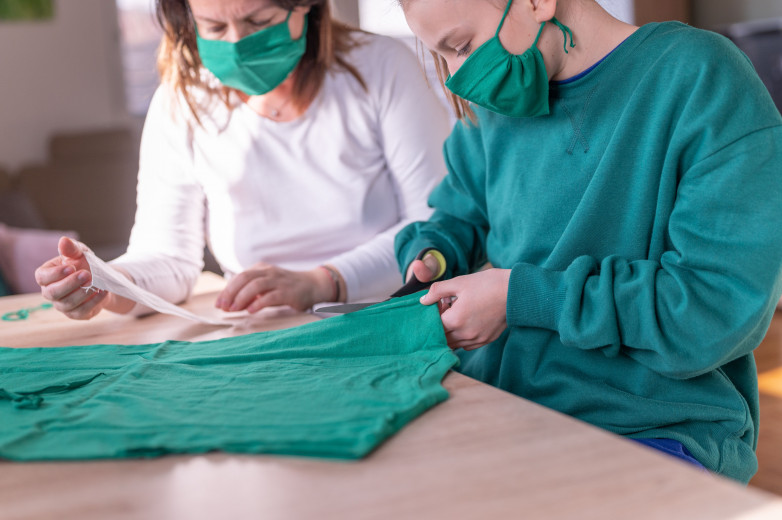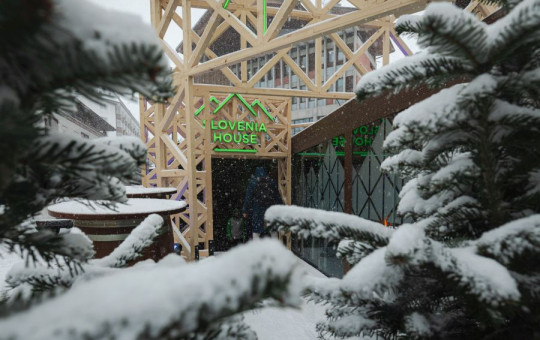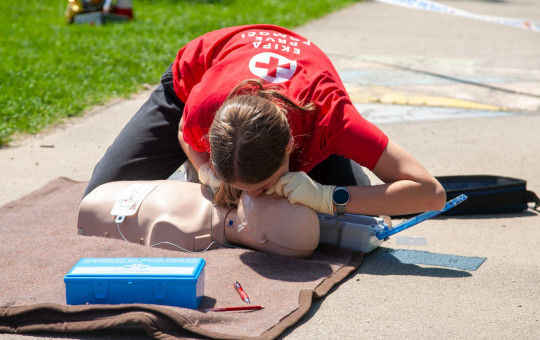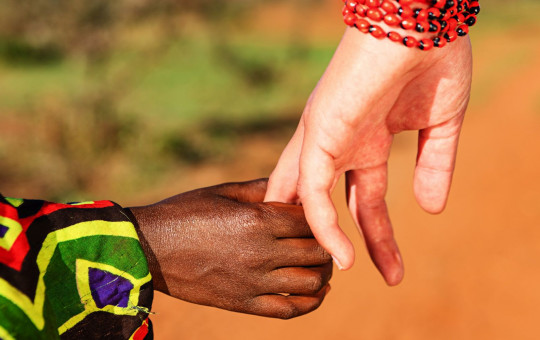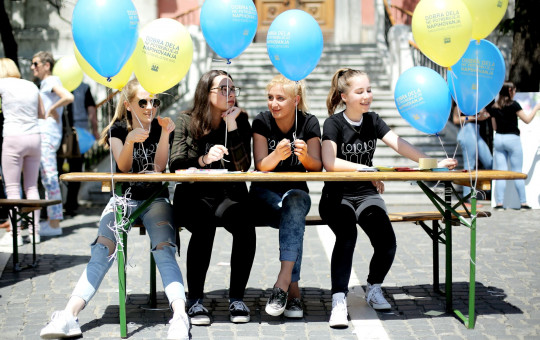Date: 7. April 2020
Time to read: 2 min
Major Slovenian textile companies and smaller textile workshops have joined forces to focus on the production of protective masks in response to market needs. At Prevent & Deloza, with its registered office in Celje and a manufacturing plant in Murska Sobota, they started to manufacture washable protective masks that protect against viruses and bacteria. The manufacturing of such masks was also launched at Boxmark, based on the sewing pattern provided by Prevent & Deloza.
The Celje Prevent & Deloza company manufactures between 600 and 700 pieces of protective masks daily. They are currently still looking for textile material across Slovenia and expect to produce at least 300,000 washable face masks in the next five weeks for protection against the infection with viruses and bacteria. About 23 seamstresses are working in the production process.
Washable face masks that protect against infections with viruses and bacteria will first be delivered to hospitals and government goods reserves, and will subsequently also be available in shops. Prevent & Deloza has 65 employees, but no one has been temporarily laid-off despite the emergency situation in the economic sector. Workers not involved in sewing masks manufacture straps and elastic bands for masks.
Prevent & Deloza are already preparing to increase their capacities in the event of an increased demand for protective masks. Now they work on adjusting the patterns and samples of protective masks with the Moda Mi & Lan company from the municipality of Petrovci and some smaller textile plants in Prekmurje. The company has also prepared for the difficult conditions in freight transport, which will be tackled, if necessary, by the additional possibilities of transporting the material required with cargo aircraft of domestic partner companies. Recently, 132 seamstresses also started manufacturing protective masks at Boxmark's company in Kidričevo, and they are expected to make from 5,000 to 8,000 per day.
-
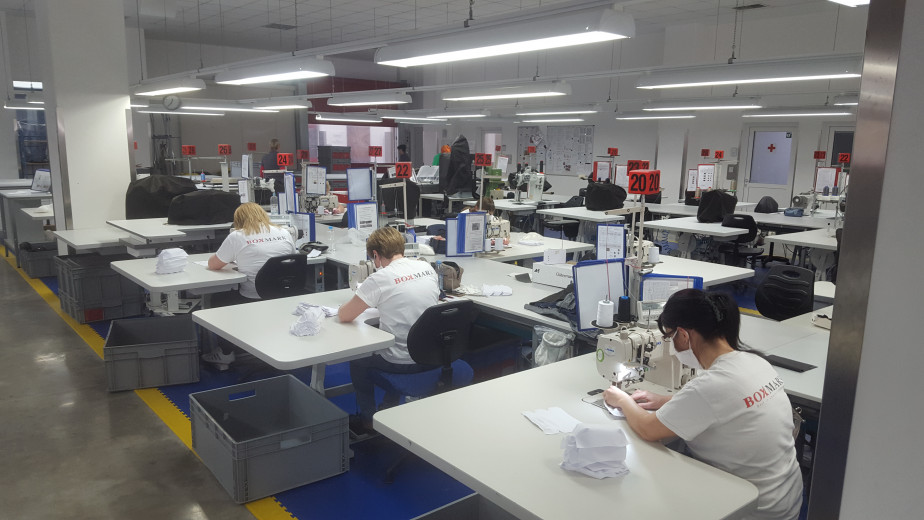 Recently, 132 seamstresses also started manufacturing protective masks at Boxmark's company in Kidričevo, and they are expected to make from 5,000 to 8,000 per day. Photo: Boxmark archives
Recently, 132 seamstresses also started manufacturing protective masks at Boxmark's company in Kidričevo, and they are expected to make from 5,000 to 8,000 per day. Photo: Boxmark archives
-
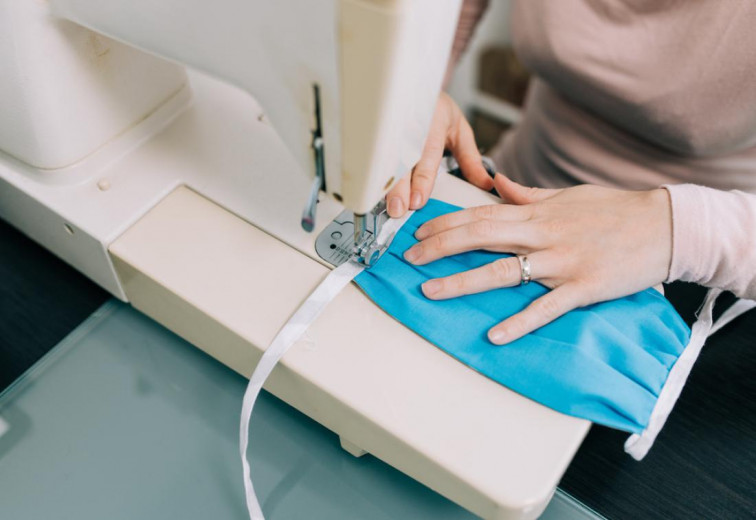 The Celje Prevent & Deloza company manufactures between 600 and 700 pieces of protective masks daily. Photo: UKOM archives
The Celje Prevent & Deloza company manufactures between 600 and 700 pieces of protective masks daily. Photo: UKOM archives
-
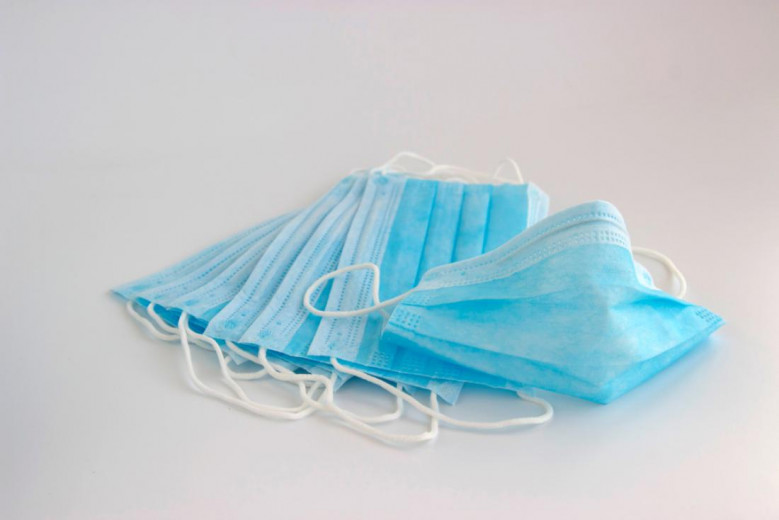 300,000 washable face masks will be produced in the next five weeks for protection against the infection with viruses and bacteria. Photo: UKOM archives
300,000 washable face masks will be produced in the next five weeks for protection against the infection with viruses and bacteria. Photo: UKOM archives
-
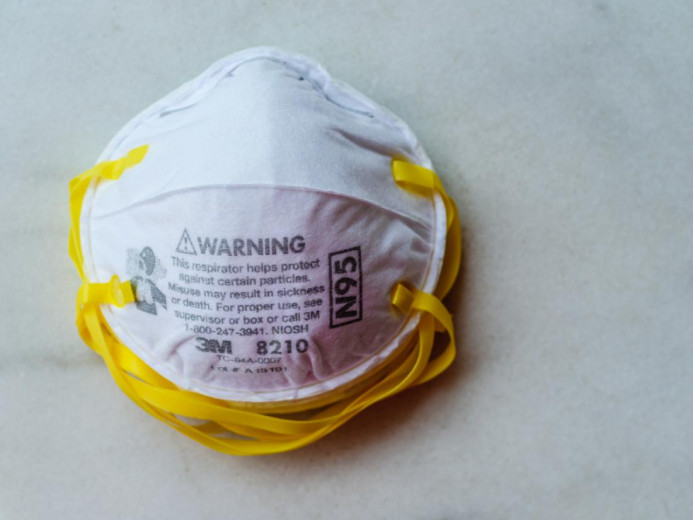 At the Petrič Printing House in Konjice, they made a prototype of a face shield. Photo: UKOM archives
At the Petrič Printing House in Konjice, they made a prototype of a face shield. Photo: UKOM archives
A growing number of Slovenian companies has begun producing protective masks
Due to the great need for protective equipment during the coronavirus epidemic, a growing number of Slovenian companies are opting for the production of protective masks. Among those engaged in this activity even before the coronavirus crisis is the company Zaščita from Ptuj, which plans to set up production also in Izola, and they even started 3D printing. This textile company with 40 employees has been engaged in the production of professional and protective clothing and other personal protective gear and equipment for three decades. The increased demand dictated the need to introduce two-shift work, so that in cooperation with contractors and subcontractors they are currently producing 3,000 to 4,000 protective masks per day. The masks have been mostly produced for the market, but now some of them have been offered to healthcare institutions.
Upon the proposal of the Commander of the Ajdovščina Municipal Civil Protection Headquarters, Mr Igor Benko, the dental laboratory of Križaj Clinic from Muljava made a design for a reusable mask to be printed using 3D printers. It is a mask consisting of two parts – the printed part has a standardised opening into which a filter is inserted. The filter can vary depending on the need.
These masks can be disinfected and the filter washed, so it can be reused several times. The filters will be made of material similar to that used in vacuum cleaners, which retains as much as 99.95 per cent of 0.3-micron particles. The masks will be tested by the Bia Separations company before being used.
Furthermore, the Ajdovščina Municipal Civil Protection Headquarters invited all sewing companies and independent seamstresses to begin sewing simple protective masks. Work is already underway and a certain number of masks is to be provided to citizens and are also expected to be available in stores.
The production of protective masks has been already launched at the Supreme company from Izola, which manufactures top-quality sails and accessories. The family-owned business with two-employees currently produces 100 masks per day and could increase its production to 150 masks per day by upgrading their work process.
-
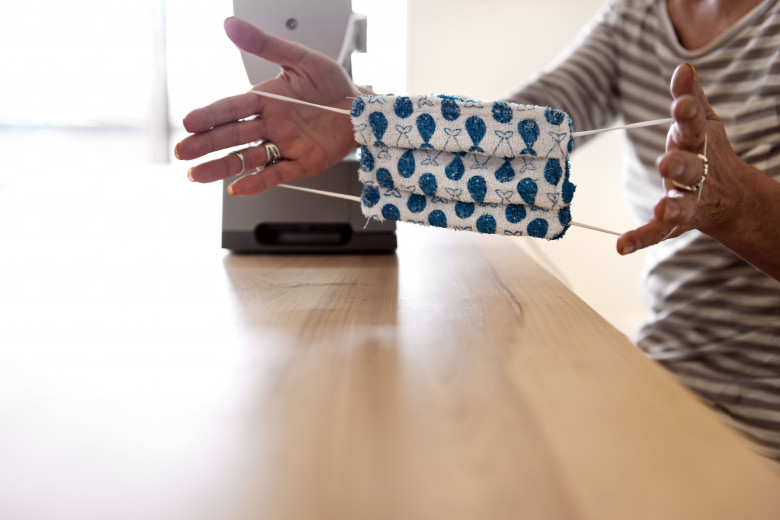 The Ajdovščina Municipal Civil Protection Headquarters invited all sewing companies and independent seamstresses to begin sewing simple protective masks. Photo: lisegagne-GettyImages/GulliverFilm&Foto
The Ajdovščina Municipal Civil Protection Headquarters invited all sewing companies and independent seamstresses to begin sewing simple protective masks. Photo: lisegagne-GettyImages/GulliverFilm&Foto
-
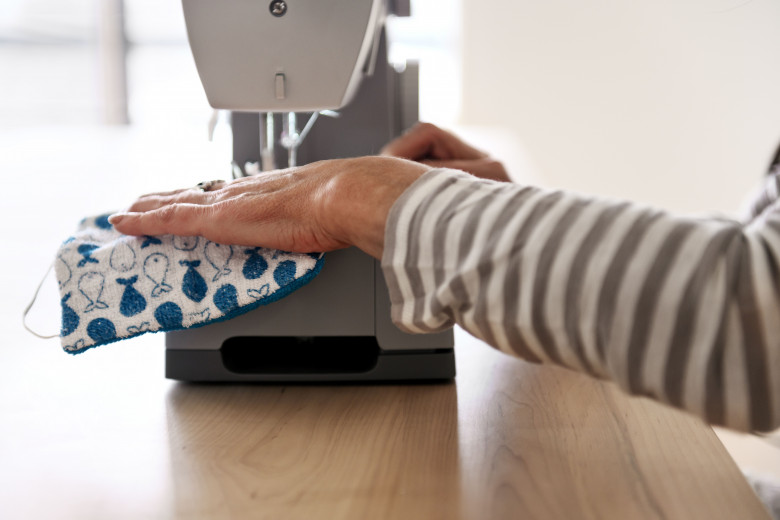 The production of protective masks has been already launched at the Supreme company from Izola, which manufactures top-quality sails and accessories. Photo: lisegagne-GettyImages/GulliverFilm&Foto
The production of protective masks has been already launched at the Supreme company from Izola, which manufactures top-quality sails and accessories. Photo: lisegagne-GettyImages/GulliverFilm&Foto
-
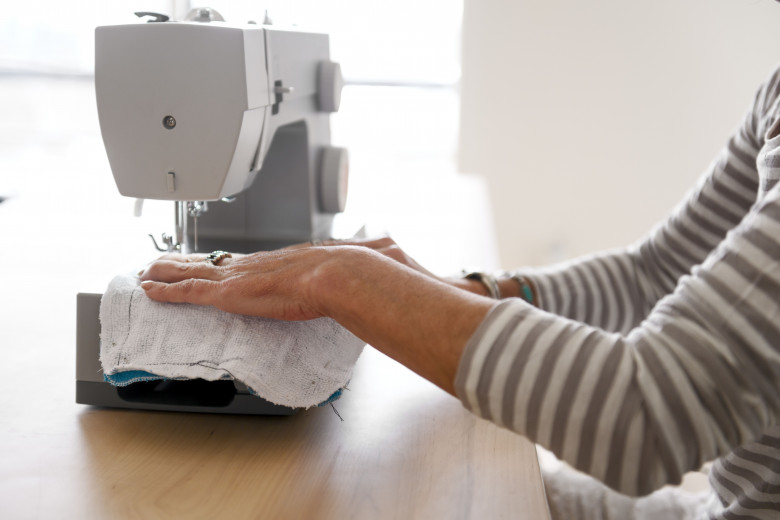 In addition, the Facebook group Slovenia is Sewing to Save Lives has been set up to assist, advise and encourage the involvement of companies and individuals in sewing protective masks. Photo: lisegagne-GettyImages/GulliverFilm&Foto
In addition, the Facebook group Slovenia is Sewing to Save Lives has been set up to assist, advise and encourage the involvement of companies and individuals in sewing protective masks. Photo: lisegagne-GettyImages/GulliverFilm&Foto
Slovenia is sewing to save lives
In addition, the Facebook group Slovenia is Sewing to Save Lives has been set up to assist, advise and encourage the involvement of companies and individuals in sewing protective masks. In the face of a widespread lack of masks, it seeks to motivate companies, sole proprietors and individuals who own a sewing machine at home to do something useful instead of sitting around and watching television. The response so far has been immense.
At the Petrič Printing House in Konjice, they made a prototype of a face shield. They have decided to donate a number of them to the retirement home and the hospital in Trbovlje, and are planning to offer further production to interested parties at a price that will only cover the cost of materials and production.
Another company from Konjice, the Ecotip company, decided last week to start manufacturing protective masks, especially for its employees. They also donated 500 masks to those in the local community that most need them, i.e. the healthcare centre, the retirement home, police officers and firefighters. These are handmade masks that have been designed by themselves, and although the demand for them is considerable, the capacities of the company do not enable the production of larger quantities.
The University Medical Centre Ljubljana is sewing their own masks
In order to increase their independence from suppliers, the employees at UKC's sewing room started sewing protective cotton masks. The news and video on the venture in their sewing room was shared by the UKC Ljubljana on Facebook, and volunteers immediately started offering their services.
Many women came forward, ready to help with sewing, and assistance was also offered by the Svet metraže fabric store, offering to donate material for production.
In the video, the UKC Ljubljana seamstresses explained in detail how to make a protective mask, which, unlike ordinary masks, is washable. The sewing pattern for the washable mask was copied from that of disposable ones, the seamstresses measured the width and length, prepared a stencil and then cut out the pieces of cotton for sewing. To enhance protection, the masks are made from two layers of cotton, and a wire is added to the nasal area so that the mask can be moulded to fit snugly on the face. The seamstresses also demonstrated the use of the mask and, with such a clear presentation, inspired many skilled people across Slovenia to try and make the mask at home. The UKC Ljubljana will use its own-made masks as a last resort if the supply of surgical protective masks continues to face complications.

